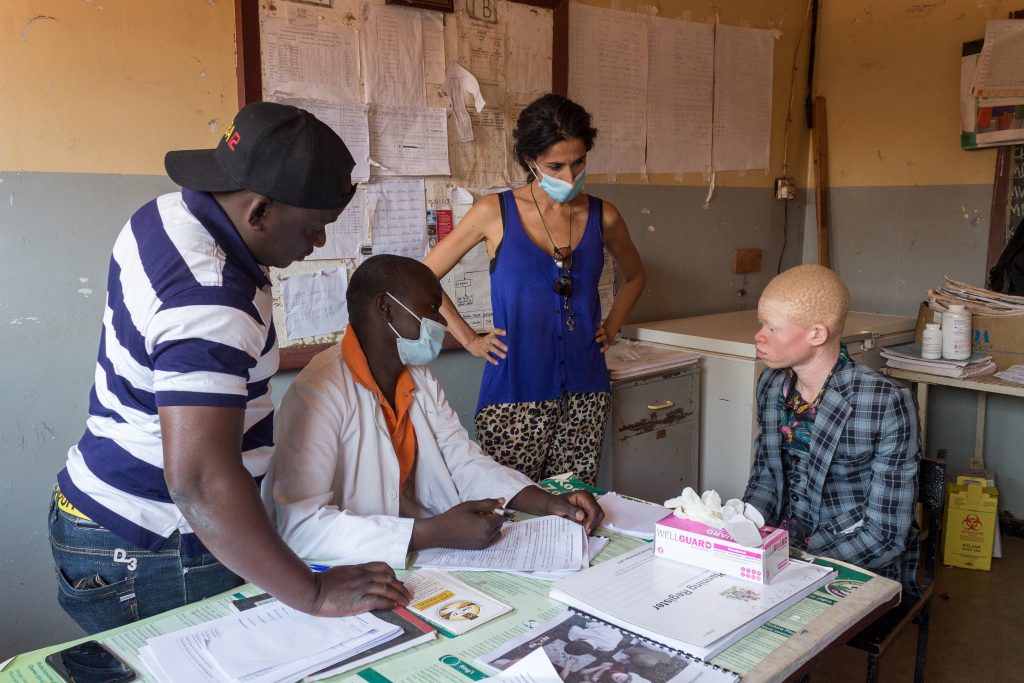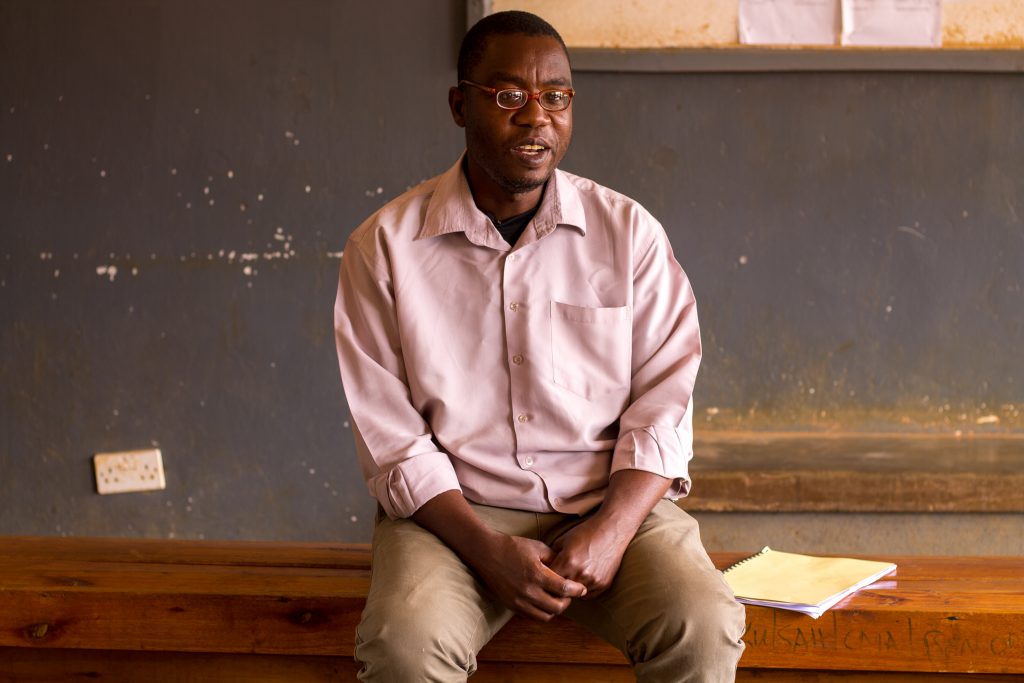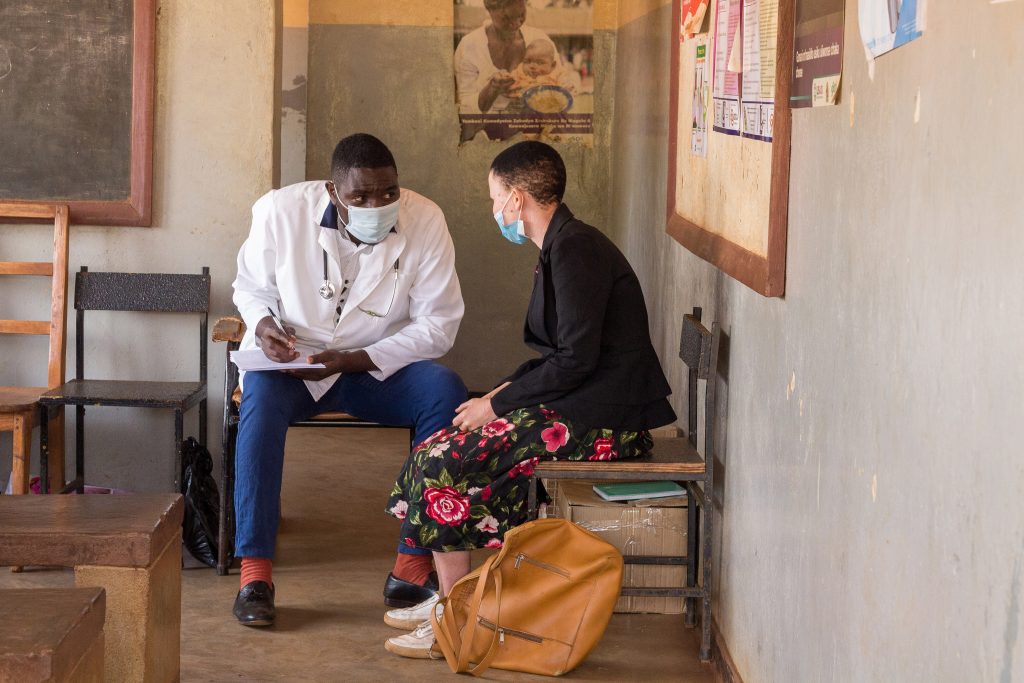“We need to know more about the people with albinism who come to our health centers every day. After this training I can better understand people with albinism and what this genetic condition means. With this information we can better help them with their health problems as our role in the prevention of skin cancer is very important“, these were the strong words of Yamikani Chinyanga at the end of the healthcare training we conducted in Dowa district, about 60 km from Lilongwe, the capital of Malawi.
Yamikani has been a medical assistant for 15 years at the small Mponela Rural Hospital and, as for most health professionals in Malawi, albinism is not included in the training programs they receive and this leads to a total lack of knowledge of this genetic condition. Although they receive people with albinism in their offices on a daily basis, they do not know how to treat them, how to detect cancerous or precancerous lesions or even the reason for their genetic condition.
Yamikani Chinyanga, with another health professional and Mafalda Soto, attend to 17-year-old Wilson Lemson.
At Beyond Suncare, since we started this path of support for people with albinism in Africa, we knew that one of the points where we had to put the focus was on local health professionals. Poor diagnosis and treatment, inadequate health services, inability to adequately treat skin diseases and lack of prioritization of national health systems in the field of albinism and dermatology are some of the biggest challenges in countries like Malawi.
In the country, there are only two dermatologists and about thirty dermatology technicians. This explains the high incidence of skin cancer among people with albinism.
That is why, together with the Malawi Ministry of Health, the Dermatology Department of Kamuzu Central Hospital in Lilongwe and the Association of People with Albinism of Malawi (APAM) we have already trained more than 100 health professionals in 9 districts of the country. We conducted trainings with theoretical classes and practical sessions for hospital care technicians, nurses, health assistants, public health workers and pharmacists to provide them with support and empowering tools to improve the health of people with albinism.
According to international institutions such as FAO, 85% of Malawi’s population lives in rural areas and more than 90% of dermatological services are in urban hospitals. For these reasons, training of health care workers in rural areas is very important to prevent skin cancer. With only two dermatologists, for a population of nearly 20 million, working in urban hospitals, it is essential to decentralize services and ensure that healthcare workers in rural and semi-urban areas close to where people with albinism live are trained.
These trainings also help us to be a tool to change and eliminate the myths and superstitions that still exist around albinism in health centers but also outside of them.
“We can say that albinism is a genetic condition and that people with albinism simply lack melanin in their skin, hence their white skin color, nothing else. And we can spread this message to the community to dispel myths and superstitions.” Wetson Kawelama is a medical assistant at the Chulu rural center in Kasungu district and also participated in our trainings. As he comments, health workers are also instrumental in normalizing the condition of albinism and sensitizing society.
Wetson Kawelama is a medical assistant at Chulu rural center in Kasungu district.
People with albinism, especially in rural areas, lack information about their genetic condition. Therefore, during the clinics, health workers like Jimmy Mkwapatira, health technician at Kayembe Health Center in Dowa district, organize a first meeting to explain what albinism is, clarifying concepts about this genetic condition, promoting self-care measures, teaching how to apply sunscreen to prevent skin cancer and pointing out the importance of going to the clinics every four months for dermatological follow-up.
It is very important that people with albinism feel that in health centers they can find a safe place to be listened to and professionals who know this genetic condition and its most important pathologies.
“I feel that I have a better understanding of how skin cancer develops and how I can prevent the appearance of lesions on my skin that ultimately lead to skin cancer. I think it is very important to train health workers because from now on they will be able to evaluate us and if we have lesions that may turn out to be malignant, they will know how to help us better. This was not the case before,” said a hopeful Wilson Lemson, a 17-year-old boy with albinism from Kachingwe village, who attended the clinic organized at the Kayembe Health Center in Dowa district.
Jimmy Mkwapatira, a health technician at Kayembe Health Center in Dowa District is treating a patient with albinism.
- Video testimony of Elias Jambo, pharmacy technician at Kasungu Hospital.




